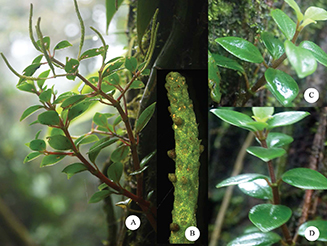New species and a revision of the genus Peperomia (Piperaceae) in Thailand
DOI:
https://doi.org/10.20531/tfb.2022.50.2.11Keywords:
Flora of Thailand, lectotypification, Piperales, taxonomy, tropical plantsAbstract
We update the descriptions of seventeen native species of Peperomia in Thailand, including a new species, P. ranongensis, and a detailed morphological description for the uncommon species P. kotana based on Thai specimens. We provide a generic description, a key to all the species and provide lectotypifications for P. bavina, P. heyneana, P. laticaulis, P. nakaharae and P. reflexa var. parvifolia. Five species, P. heptaphylla, P. masuthoniana, P. multisurcula, P. ranongensis and P. sirindhorniana, are endemic to Thailand. Peperomia pellucida is a common pantropical species. Eight species, namely P. cavaleriei, P. dindygulensis, P. heyneana, P. laevifolia, P. masuthoniana, P. moulmeiniana, P. multisurcula and P. sirindhorniana have a high potential for development as ornamental plants.
Downloads
References
Backer, C.A. & Bakhuizen van den Brink, R.C. (1963). Flora of Java Vol. 1 Noordhoff, Groningen.
Blume, C. (1826). Monographie der Ooste-indische Pepersoorten. Verhandelingen van het Bataviaasch Genootschap der Kunsten en Wetenschappen 11: 39–245. Batavia.
Candolle, C. de (1869). Piperaceae. In: A. de Candolle (ed.), Prodromous Systematis naturalis regni vegetabilis 16: 235–471. Masson, Paris.
Candolle, C. de (1898). Piperaceae Novae. Annuaire de Conservatorie and du Jardin Botaniques de Genève 1: 252–288.
Candolle, C. de (1910). A revision of Philippine Piperaceae. Philippine Journal Science 5: 405–463.
Candolle, C. de (1912). Piperaceae novae e Peninsula Malayana. Records of the Botanical Survey of India 6(1): 1–27.
Candolle, C. de (1923). Piperacearum clavis analytica. Candollea 1: 286–415.
Frenzke, L., Scheiris, E., Pino, G., Symmank, L., Goetghebeur, P., Neinhuis, C., Wanke, S. & Samain, M-S. (2015). A revised infrageneric classification of the genus Peperomia (Piperaceae). Taxon 64(3): 424–444. https://doi.org/10.12705/643.4
Frenzke, L., Goetghebeur, P., Neinhuis, C., Samain, M-S. & Wanke, S. (2016). Evolution of epiphytism and fruit traits act unevenly on the diversification of species rich genus Peperomia (Piperaceae). Frontiers in Plant Science 7(Art.1145): 1–13. https://doi.org/10.3389/fpls.2016.01145
Frodin, D.G. (2004). History and Concepts of Big Plant Genera. Taxon 53(3): 753–776. https://doi.org/10.2307/4135449
Gilbert, M.G. & Nian-He, X. (1999). Notes on Piperaceae from China. Novon 9(2): 190–198. https://doi.org/10.2307/3391797
Hayata, B. (1908). Flora Montana Formosae. The Journal of the College of Science Imperial University of Tokyo 25 (19): 1–260.
Henderson, M.R. (1959). Pepper Family (Piperaceae). Malayan Wild Flowers, Dicotyledons.Caxton Press, Ltd., Kuala Lumpur.
Hooker, J.D. (1887). Piperaceae. In: J.D. Hooker (ed.), Flora of British India 5: 78–96.L. Reeve & Co., London.
Huber, H. (1987). Piperaceae. In: M.D. Dassanayake, & F.R. Forsberg (eds), A Revised Handbook to the Flora of Ceylon 6: 272–300. Smithsonian Institution, Washington, USA.
IUCN (2012). IUCN Red List Categories and Criteria: Version 3.1. Second edition. Gland, Switzerland and Cambridge, UK: IUCN. iv+32pp.
Long, D.G. (1984). Piperaceae. In: A.J.C. Grieson & D.G. Long (eds), Flora of Bhutan 1(2): 342–351. Royal Botanic Garden Edinburgh.
Perry, L.M. (1980). Medicinal plants of East and Southeast Asia: Attributed properties and uses.The MIT Press.
Pooma, R. & Suddee, S. (eds). (2014). Tem Smitinand’sThai Plant Names, revised edition 2014. Office of the Forest Herbarium, Department of National Parks, Wildlife and Plant Conservation, Bangkok, 828 pp.
Ridley, H.N. (1924). Piperaceae. In: H.N. Ridley (ed.), Flora Malay Peninsula 3: 5–25. L. Reeve & Co. Ltd., London.
Stearn, W.T. (1957). An Introduction to the Species Plantarum and Cognate Botanical Works of Carl Linnaeus, Carl Linnaeus Species Plantarum. 1: 47.
Suwanphakdee, C. (2012). Systematics and Utilization of the Family Piperaceae in Thailand. PhD thesis, Khon Kaen University.
Suwanphakdee, C., Hodkinson, T.R. & Chantaranothai, P. (2014). New records of Peperomia (Piperaceae) in Thailand. Thai Forest Bulletin (Botany) 42: 61–67.
Suwanphakdee, C., Hodkinson, T.R. & Chantaranothai, P. (2017). New species and a reinstatement in Peperomia (Piperaceae) from Thailand. Kew Bulletin 72(1): 1–15. https://doi.org/10.1007/s12225-016-9662-5
Tebbs, M.C. (1993). Piperaceae. In: K. Kubitzki (ed.), The Families and genera of Vascular Plants 2: 516–520. Springer-Verlag, Berlin.
The Global Plants Database (2022). Published on the internet. Available at https://plants.jstor.org (accessed on 2/3/2022).
The International Plant Names Index and World Checklist of Vascular Plants (2022). Published on the Internet at http://www.ipni.org and https://powo.science.kew.org/ (accessed on 28/8/2022).
Thiers, B. (2022, continuously updated). Index Herbariorum: A global directory of public herbaria and associated staff. New York Botanical Garden’s Virtual Herbarium. Available at http://sweetgum.nybg.org/ih/
Wallich, N. (1828–1849). Numerical list of dried specimens of plants in the Museum of the Honl. East India Company/which have been supplied by Dr. Wallich, superintendent of the botanic garden at Calcutta.
Wilson, G.C. (1972). New plant records from Thailand. Kew Bulletin 26: 141–148.
Yongqian, C., Nianhe, X. & Gilbert, M.G. (1999). Piperaceae. In: Z. Wu & P.H. Raven (eds), Flora of China 4: 110–141. Science Press, Beijing and Missouri Botanical Garden Press, St. Louis.
Yuncker, T.G. (1958). The Piperaceae: a family profile. Brittonia 10: 1–7.

Downloads
Published
How to Cite
Issue
Section
License
Copyright (c) 2022 The Forest Herbarium

This work is licensed under a Creative Commons Attribution-NonCommercial-NoDerivatives 4.0 International License.


